“Google Play colluded with Facebook” according to 37 State Attorneys General Federal Lawsuit
So the litigation regarding Google’s monopoly just added another lawsuit. While it’s largely reiterative of previous lawsuits - the July 7th does have a few new allegations.
FTC & Facebook - yes it’s related and I’ll prove it
On June 28, 2021 I walked you through the recent DDC Ruling in the FTC v Facebook - DDC dismisses FTC’s Complaint - and explained that the Complaint was dismissed NOT the Case. I know that can be confusing for most — in non legalese —it’s a very wordy explanation of the Court allowing the FTC to file an Amended Complaint (technically the FTC would need to seek leave from the Court to file an amended complaint) — see below for the relevant excerpts from the article and in the Court’s own words;
The FTC Case was not DISMISSED
DDC Civil Action No. 2020-3590 Doc No. 73 (memorandum opinion) by Judge James E. Boasberg
Facebook has now moved to dismiss both actions…While the cases could be consolidated, the Court believes that clarity will be enhanced by resolving the two Motions to Dismiss in separate, contemporaneously issued Opinions. As explained in its separate Opinion, it will grant the Motion to Dismiss the States’ entire case.
…will dismiss only the Complaint… not the case…
so for now I renew my previous assessment - the FTC can file an amended complaint but they must ameliorate the various infirmities or file a notice of appeal. Simply put the FTC waited nearly 10 and 8 years, respectively to file
FTC and GOOGLE APP a brief history 2014
I think it’s prudent to remind you of the FTC MATTER/FILE NUMBER: 122 3237 September 2014 — FTC Order Requires Google to Change Its Mobile App Billing Practices to Ensure Consumers' ... using mobile apps downloaded from the Google Play app store for use on Android mobile devices. The $19M settlement centered around Google’s Play unlawfully billed parents for unauthorized in-app purchases made by their children without the parents consent.
September 14, 2014 Complaint
December 2014 final order and response letters to commenters
October 2020 USA (State AGs) v. GOOGLE LLC Case No 1:20-cv-03010
This lawsuit was filed in October 2020 by the DOJ -this case is ongoing - in short the DOJ and various State Attorneys General filed a lawsuit alleging that Google anticompetitive business model is a monopoly, see DOJ link to read the October 2020 Lawsuit, sans highlights and annotations
…under Section 2 of the Sherman Act, 15 U.S.C. § 2, to restrain Google LLC (Google) from unlawfully maintaining monopolies in the markets for general search services, search advertising, and general search text advertising in the United States through anticompetitive and exclusionary practices, and to remedy the effects of this conduct.
If it looks like a Monopoly. If it acts like a Monopoly. If it bills like a Monopoly - chases are it’s a monopoly
The Google of today is a monopoly gatekeeper for the internet, and one of the wealthiest companies on the planet, with a market value of $1 trillion and annual revenue exceeding $160 billion. For many years, Google has used anticompetitive tactics to maintain and extend its monopolies in the markets for general search services, search advertising, and general search text advertising—the cornerstones of its empire.
Yes it is that simple and like I said this case is very much still active —to help you isolate the relevant Google Play arguments in the Oct 2020 Lawsuit - see pages 21 thru 25 and pages 40 thru 45 and pages 54 thru 57 of the DOJ Lawsuit
The June 24, 2021 JSR in the matter of DOJ et al v Google found via this DDC-ECF link or you can pull it down from my public drive
Pursuant to the status conference held on June 29, 2021, the court orders the following with respect to further proceedings in this matter:
1) the court will hold a hearing to resolve outstanding disputes involving third-party subpoenas on July 14, 2021, at 2:30 p.m. via videoconference; in advance of that hearing, by July 9, 2021, the parties and relevant third parties shall file statements outlining their positions as to the issues in dispute;
2) the parties in the Colorado Action shall file a Joint Status Report on or before July 14, 2021, updating the court on progress with respect to the Plaintiff States' data requests; and
3) the parties shall appear for status conferences on July 30, 2021 and August 31, 2021, at 11:00 a.m. in Courtroom 10. In advance of those conferences, by July 27 and August 27, respectively, the parties shall file a Joint Status Report that (1) summarizes the state of discovery and (2) identifies any issues, and the parties' respective positions, that will be raised at the upcoming status conference.
37 State Attorneys General & the District of Columbia file in the NDCA
Because I have faith in my readers/followers that y’all can understand original documents but I’m also mindful of the healthy skepticism of clicking on links -on July 7th late at night (remember I’m DC local time and that puts me 2 hours ahead) the Utah Attorney General Announced via Twitter…


July 7, 2021 State AGs v Google et al Complaint
The reason I regurgitated the recent FTC ruling, previous FTC (circa 2014) Settlement and Stipulation Order/Agreement and the October 2020 DOJ cases. It is important for you to have a more wholistic picture of this years long battle.
I think it’s important to read the July 7th State AG’s complaint regarding Google in the same context.
The 144 Page Complaint can be found here -and yes it’s an open source link so you don’t have to pay the flat $3.00 (PACER charges a flat rate of $3 for filings over 30 pages long)
The State AGs alleges “exclusionary conduct relating to the Google Play Store for Android” —arguing Google has engaged in a years long illegal antitrust, anticompetitive and unfair business practices. The lawsuit also accuses Google of using its “dominance to unfairly restrict competition with Google Play Store” thus harming consumers by “limiting choice and driving up app prices” —in short Google uses its immense power to unjust enrich itself and harms residents in each of the 37 States and the District of Columbia
This newest Antitrust lawsuit largely centers around
Google’s exclusionary conduct, which substantially shuts out competing app distribution channels.
Google also requires that app developers that offer their apps through the Google Play Store use Google Billing as a middleman.
‘Google’s payment processing system to an app distribution channel forces app consumers to pay Google’s commission – up to 30% – on in-app purchases of digital content made by consumers through apps that are distributed via the Google Play Store.
This commission is much higher than the commission that consumers would pay if they had the ability to choose one of Google’s competitors instead.
The State AGs also allege that Google’s onerous actions result in the closing of the Android Ecosystem— insofar as Google promising to keep it an open platform. Google didn’t honor their present public pledge.
discouraging or in some instances the outright prevention of healthy competition, violating federal and state antitrust laws.
Google has made promises to app developers and device manufacturers that it would keep Android “open source,” —fostering an environment where developers can create compatible apps and distribute them without unnecessary restrictions.
US Consumers and “smart devices”
The fact is, the majority of us use our mobiles devices, such as mobile phones and/or tablets have largely replaced the traditional desktop computer, televisions and laptops. The Apps have become their own technology and financial ecosystem -as the facts and figures disclosed in paragraphs 6 and 7 are eye-popping
Consumers spend $32 billion a year in-apps
Mobile internet usage is rising while desktop internet usage continues to fall, and U.S. consumers spend nearly 90% of their mobile internet time within apps instead of mobile browsers. They also spend over $32 billion a year purchasing apps and digital content within apps. App developers likewise invest hundreds of millions of dollars to build and distribute apps for mobile devices
Google and the Android Monopoly
The State AGs allege that while Google has publicly made promises specifically concerning Android’s Open Source System —yet the reality is Google hasn’t just broken this promises but they have set up an apparatus (App Development, Google Play and Google Play Billing) to control >90% of the Android Market.
direct downloading and installation of apps or app stores; and
apps or app stores pre-installed on devices by device manufacturers and/or mobile network operators.
distributing Android apps. Google Play Store distributes over 90% of all Android apps
requires all app developers that sell content through the Google Play Store to sell any digital in-app content through Google Play Billing.
stringently enforces this tie by preventing apps distributed through the Google Play Store from using, directing consumers to, or even informing consumers about alternative payment processing options that may provide lower prices
This illegal tie gives Google an additional monopoly in the market for Android in-app payment processing for digital products. Google has not yet extended its tie to in-app purchases of physical goods and services and requires the use of an alternative payment provider.
Google App and Sideloading App
Because Google uses its immense power to force Billing and it’s users to load Apps via Google’s App Store. It also simultaneously restricts App developers from allowing consumers to go to a website via a browser on a mobile/smart device and download an app directly from that website. This process is colloquially known as “sideloading” —provided the website actually has an option for a consumer to download the app from their site versus Google’s App Store.
Notwithstanding Google has taken increasingly stringent actions to dissuade customers from “sideloading”. For Example the State AGs argue
Goggle ensures a consumer who tries to sideload an app needs to go through many extra steps, such as clicking through warning screens that claim exaggerated security risks, even when the app being downloaded is clearly safe. The states see this behavior as not only being part of an antitrust violation, but also as constituting a deceptive act or practice under the consumer protection laws of many of the states.
Google’s ongoing anticompetitive policies:
Google continues to require certain lines of business, such as games, exclusively use Google Play Billing for in-app purchase payments. Google has recently announced that it now intends to enforce the same requirement on additional lines of business, including streaming services. Also see Google Play’s Developer Distribution Agreement -and lastly Google updated billing policies for —Existing streaming services were given until September of 2021 to transition over to Google Play Billing.
Google and Android Ecosystem
Based on the years long investigation—various State Attorneys General found that not only does Google have an absolute monopoly (from a App, Content and Billing) within the Android Ecosystem —Google’s actions have fortified their revenue streams by way of up to 30% commissions they are paid, complete control over the App Distribution, weaponized and leveraged Artificial Intelligence and stringent contract Ts & Cs. Google has acted in ways to essentially strangle and smother competition before it makes it out of the Developer’s crib.
State AGs Five Areas of Focus:
Number one: the AGs argue that Google -through a set of imposing restrictions, restrictive contract terms and conditions from App Developers, preventing Android customers from downloading Apps directly from the Developer’s website aka “side loading”…also limits the android manufacturers from changing their OEMs that would allow a consumer to “side load” apps. Embargo other App stores from distribution on Google Play. And then further embargoing these competing App stores from advertising on Google’s other platforms, like YouTube and downgrades (assuming this is accomplished by Google’s internal algorithms) these competing Apps stores in the Google search function. Like I said Google essentially snuffs out the competition at the cradle and it doesn’t stand a chance of surviving Google’s preventive measures.
Number Two: while not explicitly tortious interference -it is clear that Google’s objective (concerning) Android Manufacturers and Mobile Network Operators contracts —the preloading feature meant that you as a consumer could not delete or otherwise uninstall Google Play. And that is something I was unaware of and I’ll bet so are you..
Number Three - this is strictly related to Samsung —who is presently the leading android manufacturer (see May 2021 CounterPoint Research) for US based customers. Here the State AGs argue that Google has taken steps to “buy off Samsung to limit competition from the Samsung Galaxy App Store” and none of this was disclosed to Samsung Customers. In my industry we call this exhortative and deceitful behavior —which almost always adversely impacts customers.
Number Four: I think an argument can be made that Google has long engaged in predatory practices. That as a business model they will do what it takes to kill any competition. And if that means paying bribes or extorting developers that Google views as a threat - then Google will do what it takes to protect its behemoth monopoly
Number Five: I think there’s a word for this - it’s called self dealing by way of deception and entrapment. Granted I could be wrong in my assessment but everything in this lawsuit comes down to Google doing what ever it takes to protect their monopoly - anti trust laws be damned.
You know what this lawsuit brings to mind? The fictional character Gordon Gekko - for the record Google is Gordon Gekko.
“Greed for a lack of a better word is Good”
State Attorneys General Prayer of Relief
The July 7, 2021 Lawsuit seeks;
an injunction with terms that open up competition in both app distribution and in-app payment processing.
monetary damages for the affected consumers in our states (this is similar to what the State AGs filed in the e-books case against Apple and the main publishers of e-books. The AGs obtained various overcharges and those were refunded to consumers’ accounts.)
We are also seeking civil penalties to deter future wrongful conduct, disgorgement of Google’s profits, as well as attorneys’ fees
Should you question the provenance of the State AGs July 7, 2021 Lawsuit
So many lawsuits - so little time
If you are confused by the numerous lawsuits. That’s okay because it is confusing—especially if you’re not well versed in the ongoing litigation. The reality is there numerous lawsuits but there are three current lawsuits that have overlapping arguments and cause of action. And those are the ones you should pay attention too. The sad reality is the Senior FTC Officials knew Google was becoming a behemoth monopoly but they refused to listen to the more Junior FTC employees —and now in 2020 and 2021 they are trying to control the monopoly they helped create —you should have listened to the outside counsel and your Junior staff - we tried to warn you but no you ignored us…
So for now I’d watch the newly filed Lawsuit and the DOJ et al October 2020 Lawsuit - as that case has a few hearings coming up in the next few weeks. In short the newly filed lawsuit might actually survive the expected Google MTD largely because of the new billing policies that go into effect in September 2021 —so the timeliness question isn’t or at least shouldn’t be a factor.
Because I have files and I have questions—like if the MSM continues to (wrongly) obsess over Trump’s bullshit social media lawsuit - then you should also focus on lawsuits that could have an impact on millions of Americans -but I suppose that’s none of my business
-Filey

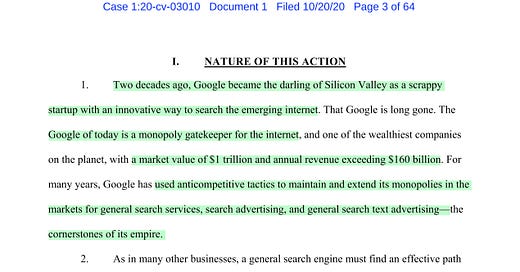




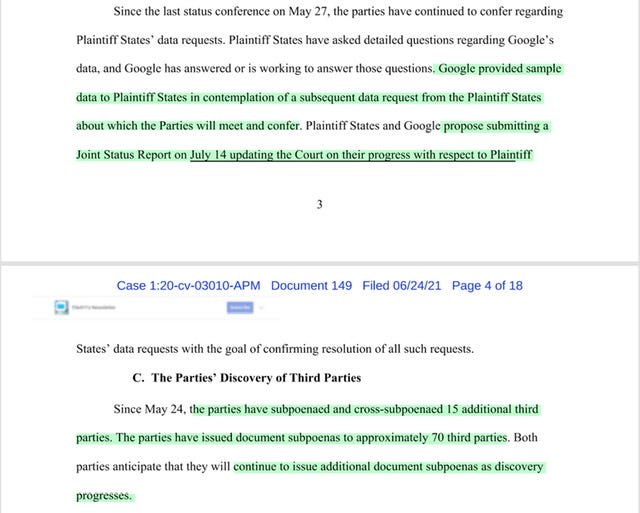

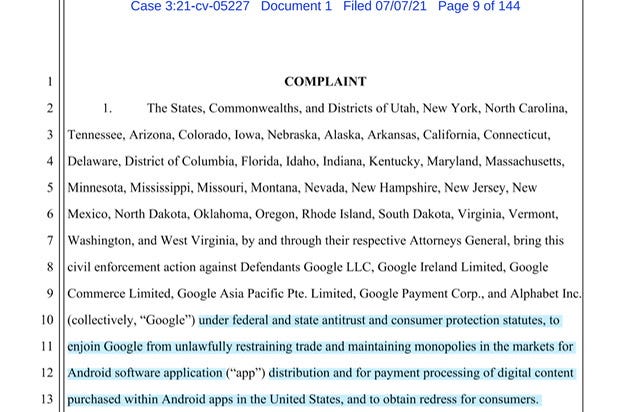
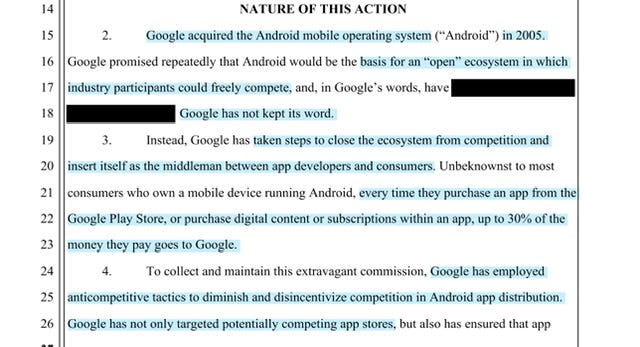
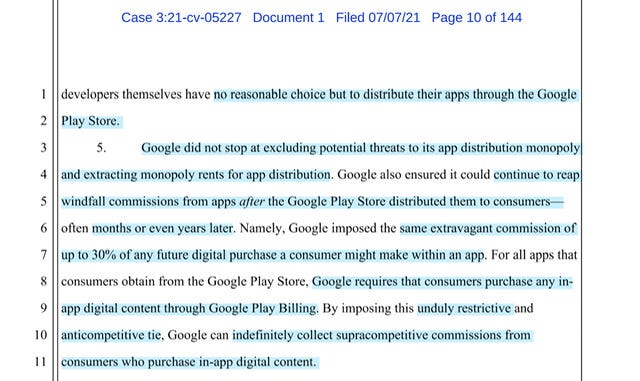
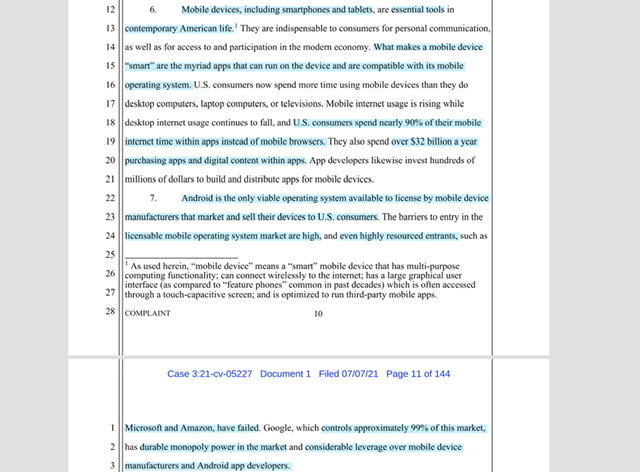


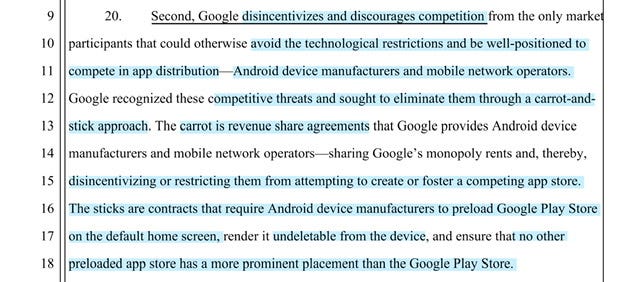

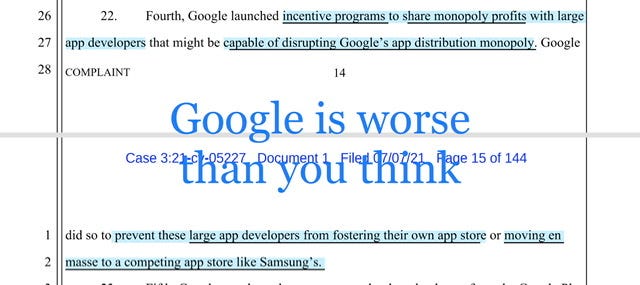


Good news... I feel really sorry for the people who thrive on fake bad news these days. What are your thought on Biden’s new executive order? Seems like that can only help bolster the individual state’s lawsuits you’re talking about here to me.
https://twitter.com/toppan_jane/status/1413504776768147466?s=21